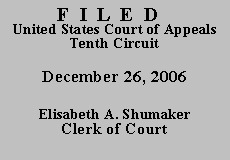

| DAVID A. WILLIAMS, |
|
We review a district court's ruling on a motion for relief from judgment for an abuse of discretion. Sorbo v. United States Parcel Service, 432 F.3d 1169, 1177 (10th Cir. 2005). According to Rule 60(b), a motion for relief from judgment "shall be made within a reasonable time." Fed. R. Civ. P. 60(b). Moreover, such a motion may only be granted for the following reasons:
(1) mistake, inadvertence, surprise, or excusable neglect; (2) newly discovered evidence which by due diligence could not have been discovered in time to move for a new trial under Rule 59(b); (3) fraud (whether heretofore denominated intrinsic or extrinsic), misrepresentation, or other misconduct of an adverse party; (4) the judgment is void; (5) the judgment has been satisfied, released, or discharged, or a prior judgment upon which it is based has been reversed or otherwise vacated, or it is no longer equitable that the judgment should have prospective application; or (6) any other reason justifying relief from the operation of the judgment.
Id. Because Mr. Williams has offered no explanation for the two-year lapse between the district court's order dismissing his 1983 action and his motion for relief from judgment, and has not otherwise shown that his case falls into one of the six narrow categories under which relief from judgment is appropriate, the district court did not abuse its discretion in denying his Rule 60(b) motion.(1)
Mr. Williams's appeal is "without merit in that it lacks an arguable basis in either law or fact." Thompson v. Gibson, 289 F.3d 1218, 1222 (10th Cir. 2002). We DENY Mr. Williams's motion to proceed IFP under § 1915(a)(1) and DISMISS this appeal pursuant to 28 U.S.C. § 1915(e)(2)(B)(i). Mr. Williams is responsible for the immediate payment of the unpaid balance of the appellate filing fee. The dismissal of this appeal counts as one strike pursuant to 28 U.S.C. § 1915(g). See Jennings v. Natrona County Det. Ctr. Med. Facility, 175 F.3d 775,
780 (10th Cir. 1999).
Entered for the Court
Paul J. Kelly, Jr.
Circuit Judge
*. This order and judgment is not binding precedent, except under the doctrines of law of the case, res judicata, and collateral estoppel. It may be cited, however, for its persuasive value consistent with Fed. R. App. P. 32.1 and 10th Cir. R. 32.1.
**. After examining the briefs and the appellate record, this three-judge panel has determined unanimously that oral argument would not be of material assistance in the determination of this appeal. See Fed. R. App. P. 34(a); 10th Cir. R. 34.1(G). The cause is therefore ordered submitted without oral argument.
1. In its order, the district court also denied two motions for relief filed by Mr. Williams on the grounds that the relief sounded in habeas corpus, and that the prosecutors were protected by absolute immunity. To the extent Mr. Williams challenges that portion of the district court's order on appeal, we affirm for substantially the same reasons set forth by the district court.